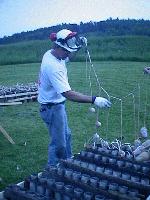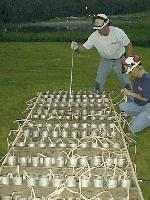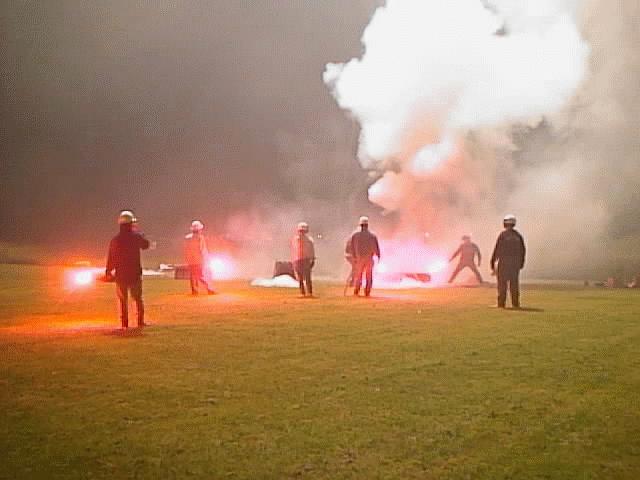 Saturday, July 4, 1998, Ludlow, Vermont -
They call them bombs, as in "Mike, fire off those eight-inch bombs over there." This works for me, because I'm frightened to hell of the things as I pull each one from a box labeled "Dangerous Explosives," unroll the thirty-six inch fuse, spin around and hand it to Brent to load for firing. I wonder seriously how my thin leather gloves, plastic glasses and "hard" hat will protect me if this sucker goes off in my hands, just as Troy yells "debris!" and I scramble to check that my boxes are all covered against falling cinders.
Saturday, July 4, 1998, Ludlow, Vermont -
They call them bombs, as in "Mike, fire off those eight-inch bombs over there." This works for me, because I'm frightened to hell of the things as I pull each one from a box labeled "Dangerous Explosives," unroll the thirty-six inch fuse, spin around and hand it to Brent to load for firing. I wonder seriously how my thin leather gloves, plastic glasses and "hard" hat will protect me if this sucker goes off in my hands, just as Troy yells "debris!" and I scramble to check that my boxes are all covered against falling cinders.
How could I possibly report on America for you, without writing a fireworks story on today - our day - the Fourth of July? And how could I write a fireworks story without putting my head right in the thick of it and joining an expert pyrotechnics crew? As luck has it, I am on the crew that orchestrates the largest fireworks display in Vermont (in Bellows Falls) led by Brent Lisai of Chester, Vermont.
|
"After such bedlam, it's like we had slaughtered a magnificent beast, not created one." |
Brent Lisai is an imposing man, over two yards high, upper torso like a Harley V-twin, and all steel - but relaxed and easy-going. You would reach Canada before you found a nicer guy, and by the end of this night, even I am calling him "Brenny". I would like to find out why he enjoys his job so much, other then that he gets to blow things up, of course.
His crew is a collection of volunteer firemen who, it appears, do enjoy being on the other end of the match sometimes. Larry Clark, Robert, James and Troy Wheeler and Brent, Lonnie, Cindy and Mike Lisai make up this crew. They have found that, when you're working with this much fire power, it's nice to work with kin.
The Lisai family, owners of Lisai's Market, in Chester, Vermont, has been displaying fireworks for thirty-five years, usually led by Leonard Lisai. "This is the first year we've fired without him - it's funny being without him," says Brent, of their seventy-seven year old father. "He worked this morning, checking everything, but he just couldn't get out here tonight."
Here is how I spent my evening:
Ever worked on a pyrotechnics crew?
Here's your chance to be behind the scenes.
The pipes are the artillery ordnance for this battle of the senses. Each one is about three feet long and is made of three-eighths inch steel with a heavy steel cap welded on one end. We plant ten of these along the front of our encampment, each buried two-thirds into the ground and pointing slightly away from us. "Seat it well on a rock," Mike Wheeler tells me as I'm planting one in the ground. "We had one last year that didn't have a good enough footing - blew the bottom right out of it."
Three-eighth inch steel, blew the... I tug on my gloves and consider wearing a cup.
6:50 - Cindy starts unbanding the fuses of the mortars, packed in Brent's van. Each bomb comes with a fuse wrapped in paper, flat-rolled and banded. I help with the boxes as she unbands hundreds of fuses. No smoking allowed. Not even any "got-a-match?" jokes allowed.
7:00 - The hardware is set up and now it's wait-and-see time. The sky looks moody and Brent doesn't want to load the fireworks if it's going to pour. He puts the crew on hold for half an hour.
7:09 - We sort out the safety gear. Each person gets a pair of cotton or leather gloves, glasses, a hard-hat and foam ear-plugs.

Brent Lisai pre-loads a string of four-inch fireworks mortars into their launching tubes.
7:30 - We start loading the finale'. There are two parts to a fireworks show. I would call it the Army and the Navy. The main segment is the Army, and it comes out of the big pipes out front. A steady, thunderous roll of a hundred bombs, each individually loaded and lit during the show. It is impressive.
The Navy is the finale', nearly three-hundred mortars pre-loaded and fused to go off in less then a minute, like the phalynx ships carry to ward off incoming missiles.
The finale' takes a while to load as we put each bomb into its tube. They are also called "mortar" or "shells". I refer to them as "coconuts" because that is just what they look like, especially the larger, eight-inch ones. The smaller, four-inch mortar look like, well, smaller coconuts. We run the fuses neatly and connect them in two strings. One touch of the flare to the lead fuse and one-hundred and forty howling, banging, dazzling, exploding coconuts will light up this sky.
Mike and a trainee, Angela, spend an hour with about twenty large bombs, loading them in tubes and attaching a "squib" to their fuses. This electronic detonator will help launch these bombs quickly and from a distance. "I love rookies," Brent says. "They get such a thrill setting these things off - they always come back."
8:06 - Brent makes the decision to cross the point of no return and tamp down the finale' mortars. The sky still looks threatening, but it hasn't rained at all, and he has to move ahead. He seats each one in the bottom of its tube with a long rod. If he doesn't push a bomb all the way to the bottom, it won't fly out of the tube enough - if at all - and will explode right right next to us, which will be pretty embarrassing and really frightening.
Unfortunately, what Brent is doing unsettles the mortars enough that you would not want to remove them and carry three-hundred of them in the back of your van. So this is it. We fire these suckers here or we douse them.
Brent Lisai pushes each of the explosive charges to the bottom of its tube. Without this cautious step, a mortar may explode too close to the ground.
Cindy Lisai connects fourteen strings of ten charges each, together so that one hundred and forty fireworks will launch off a single fuse.
8:27 - The rains come. The annoying kind - just a slight drizzle. Enough to dampen the shells and fuses, yet light enough to keep the show on. We place Visqueen over the small finale' stages and place sheets of thick, black, roofing rubber under and over the boxes of bombs. Mike secures sheets of aluminum foil at the larger finale' stage, individually crowning each large, preloaded mortar.
8:45 - Gunther Sinler, Ludlow Parks and Recreation Director, arrives on an empty parking shuttle bus and talks to Brent. "It's in your hands," Brent says, hoping to push the start time up. "You tell us when." Gunther wants the start to remain at 9:30 - the advertised time. The whole crew gets on edge. The longer we hold out, the damper the air gets, the damper the fuses get, and the greater the chance that the skies will open right up on us.
Gunther tells us to watch the parking lot lights behind the audience. He will flash them to signal the start of the show. He leaves.
8:52 - The Ludlow Fire Department arrives. The rescue truck pulls alongside us, raises a lighting panel and lights us up like Monday Night Football.
8:55 - Teams. This is one of those things that just cannot be done until the last minute. Everyone meets next to the boxes of bombs and Brent decides who will do what jobs tonight. On the four-inch bombs, Brent will load, Cindy will fire and I will, well, pull the bombs from the box and hand them to Brent, a critically important position, I'm told.
Robert, Troy and Mike team up on the five-inch bombs and Lonnie and Jim on the six and eight-inch bombs. Larry will fire the finale' and will fill in gaps in the main show. He will do this from behind the van, because Larry knows better.
9:04 - The fire truck leaves, rolls down the hill to the audience and lights that area.
9:05 - Larry cannot wait any longer, he has to set up the electronics. In the rain, he wires the squibs to a portable electronic panel placed behind the finale' stage, and covers it with a cardboard box. He will wire this panel to another one near the van.
9:07 - The parking lot lights go out, and that inspires the crew toward mutiny. "Brenny, that's the signal," someone says. "Let's go. Let's do it."
Brent is off-put. Gunther said nine-thirty, but... "No. He's gonna flash the lights," he says. "Brent, you can't flash sodium-vapor lights," Jimmy retorts. "He wants us to start!" Brent hunches up and thinks, his massive arms crossed on his chest. He holds firm. "We fire at nine-thirty."
9:10 - Larry performs a circuit test to check that the finale' is fully wired and ready. The test will check all the circuits without heating the squibs. The test is successful.
9:14 - Three kids, playing football or something, stray too close and Brent whisks them away like flies. "Get back, kids," not breaking his stride. "It's like a magnet," Larry tells me (he has been pushing them back all night.) "They want to get as close as they can."
9:17 - The parking lot lights are still turned off and we decide that Gunther had "turned the house lights off" for the audience. People have surrounded us, on the roadside and on the berm beside us - on our right flank, a large deck party is going on.
9:18 - The firemen start lighting flares - common red, roadside flares, about eighteen inches long. They put six flares on the ground along the front tubes to light our stage, then each fireman lights a flare to use for lighting fuses. Each time a flare is lit, the audience frenzy builds.
9:22 - Brent reviews with me what he wants me to do. I am to pull bombs out of four boxes, unwind the fuses and hand them to him. Since I will be handling four-inch mortars, I must not give one to anyone who needs a larger bomb. If a mortar is too small for the tube, it will rattle around instead of launching and will explode in our faces. I can pick the mortars in any order I please. This means that (in my mind) since I choose what gets loaded when, it is really I who is running this show. I don't brag about this.
9:30 - No lights. We wait. Maybe Jimmy was right; you can't flash the damn things. The audience is getting anxious. Rob and Lonnie are at-post, ready to light the opening double-volley. Brent looks carefully around at his crew. He is about to set off half a ton of black powder and he wants control. He checks every person with eye contact. He scans the backfield for children. He takes a mortar from me, glances at Cindy, then at Robert before giving the order.
"Rock and roll!"
The next twenty minutes fly past. I am hauling the bombs out as quickly as I can, but each time I have one ready, Brent is right there - I can't get ahead. We have at least three charges launching at a time and the noise is incredible. My heart is racing and, with my ears plugged, the sound of my own breaths fill my head.
The scene is like a very, very loud ballet, under an awesome light-show. The handlers pass the bomb to the loader who weaves between the firemen to one of the tubes, while the firemen and the loader dramatically keep the flares and the fuses far apart. The loader crouches, drops the mortar in the tube, removes the fuse cover and runs back. The fireman lights the fuse, sometimes at the end, giving him or her about three seconds to jump away, and sometimes halfway up, giving him or her about enough time to regret doing so.
Then the boom, like a car exploding, or a bank vault door being torn off and a "whoosh!" as the charge goes to flight. The audience cheers when the big ones explode and Brent yells to me as I pass him a Red and Blue Salute; "That's it, Mark. I love the crowd. I love to hear them cheer."
I try to look up occasionally to see the glory, but I am consumed with my job of passing mortars, staying the hell out of the way and watching these guys lay fire to the night sky.
There is a brief lull in the firing and Brent calls in his reserves; "Keep the show going, Larry," he shouts. Larry taps a few switches and "boom, boom!" our ceiling lights up again and we load our guns.
I hand off a Chinese Rainstorm, then a Golden Kamuro, a few Salutes and a Blue-to-Silver Penny with Pistil. Next is a Grand, Red, White and Blue Scorpion, then a Red and Blue-Tipped Tourbillion. The names are as colorful as their displays.
When I reach the bottom of my box, it is time for the finale'. We clear the main stage of all the mortar, uncover the finale' stages, check the fuses and clear out.
Tonight the fuses are just damp enough to slow the finale' down. Larry has the big shells flying beautifully, but we need someone to get to the smaller ones and keep lighting the fuses. I can see Brent doing this through the smoke and the flash, looking like someone trying to rescue a porterhouse at a way-out-of-control barbecue.
The finale' is incredible. From here the stage looks like a house-a-fire and the sky, like New Year's Eve. I am slightly dazed and so absorbed by the action that, after the closing double-volley, I am startled by a wave of applause from people all around us. The scene turns surreal; the debris floating to the ground, the roar of the audience, my breathing, my heartbeat, the steady whisper of the flares... After such bedlam, it's like we had slaughtered a magnificent beast, not created one.


Laying fire to the night sky, Ludlow, Vermont, July 4, 1998
For other jobs to dream about while you're at work...
Return to our
MAIN page

